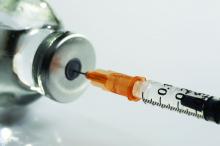A novel vaccine may provide a breakthrough treatment option in colorectal and other cancers.
“We [researchers] at the Peter MacCallum Cancer Centre in Melbourne, Australia, have developed a new, DNA-based vaccine, which we call TetMYB, for the treatment of MYB-overexpressing cancers such as colorectal, adenoid cystic carcinoma, and breast cancer, to name a few,” Toan Pham, MD, of the Peter MacCallum Cancer Centre, said in a media briefing in advance of the annual Digestive Disease Week® conference.
The immunotherapy approach described by Dr. Pham involves combining the TetMYB vaccine, which boosts the immune system, and an antibody, BGB-A317, that helps enhance the effectiveness of the vaccine.
The vaccine is administered in the skin where it is taken up via the dendritic cells, which then migrate to the lymph glands where they transfer the vaccine to the cytotoxic T cells, which target and kill cancerous tissues. When these cytotoxic T cells interact with tumor cells, they often encounter countermeasures from the tumors that attempt to inactivate the immune cell by binding to the PD-1 receptor on the cytotoxic T cell. This is why the BGB-A317 antibody is so important. It will bind to the PD-1 receptor, which blocks the PD-L1/L2 ligand on the tumor cell from binding to the T cell, rendering its cytotoxic effects useless. This “immune checkpoint” allows the cytotoxic T cells to function normally, and lyse the tumor cells.“The research we are presenting at DDW involves testing this approach in mouse models, which we had previously published. In our studies, tumors in the mice responded very well to the treatment and cancer was cured in about half of them,” stated Dr. Pham.
The study is really composed of two smaller studies that looked at colonic adenoma, induced using tamoxifen-enriched feed, in a total of 22 mice. The mice were split into two study groups: 15 in a prophylactic study and 7 in a therapeutic pilot study.
In the prophylactic study, eight treatment mice received three TetMYB vaccinations at weeks 7, 9, and 11. Tamoxifen was given to the treatment and control mice at week 13.


